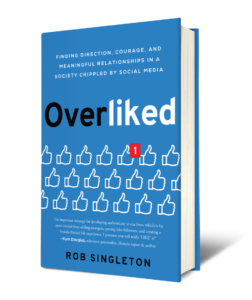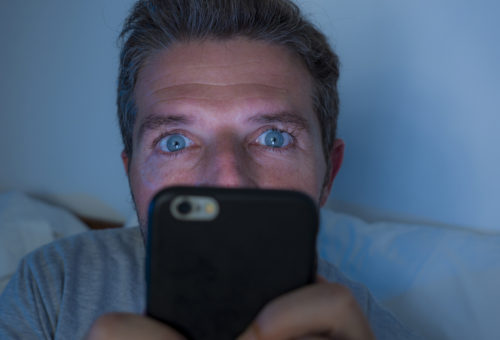You see wonderful things on social media! Newborn babies, birthdays, weddings, communities coming together to help one another. You also see crazy stuff on social media! Like one woman who created 150 of the same outfits worn by Princess Kate (but looks nothing like the princess in them). Then there are those who make themselves look like Barbie dolls. One has racked up 1.2 million followers; another racked up 36 plastic surgeries. (True facts!)
What is it about social media that fosters this life-altering behavior? And why is our mental and emotional state so closely linked to our social media use? Let’s dig a little deeper…
FOMO
Instead of finding a vibrant community online, we find ourselves awash in a sea of negative emotions. Instead of fostering connection, social media tends to foster competition…comparison…jealousy…anxiety…with a side of FOMO (fear of missing out). These emotions lead people to do crazy things.
And FOMO is real, creating lower levels of life satisfaction. People with FOMO live in a vicious cycle of being driven to check social media more often and then “up the ante” on whatever or whoever they perceive as being ahead of them in the make-believe race they’ve entered, all of which only increases their FOMO.
By the way, FOMO is nothing new. It’s what the tempter (Satan) used in the early chapters of Genesis in order to get the first man and woman to doubt God—or to suspect that they were missing out on something God wanted to keep for himself. Pretty incredible when you consider that it doesn’t get any better than paradise! Yet that’s how powerful FOMO can be.
Confusion and Disconnection
It is obvious that the onslaught of online content can leave us confused and completely disconnected from the reality of the world around us. Psychology Today says that we often subtly substitute virtual relationships for the real flesh-and-blood connections that we so desperately need.
Many studies have been conducted regarding the effects of social media on self-esteem, but they all seem to point to the same thing: the more time a person spends on social media, the lower their self-esteem.
Lower self-esteem is commonly attributed to the fact that social media users feel as if they’re (1) being overlooked and (2) developing an intense tendency to compare themselves to others. This mental anguish seems a little contradictory compared to the promised joy of all those “friends” and followers, right? Shallow relationships, negative emotions, and the insatiable need for validation are a toxic cocktail.
Even those influencers, who have gathered millions of followers, struggle with feelings of depression and anxiety. If you achieve your goal of global success online, the constant pressure to maintain metrics and numbers can be crippling. A perfectly curated feed often hides feelings of inadequacy and inner struggles. Summer, a 20-year-old lifestyle vlogger with a million followers, says that viewers often see YouTubers as characters in a show instead of real people. The kind of constant scrutiny they endure doesn’t bring fulfillment; it makes them feel fake.

In a hilarious illustration of this, Aquaman star, Jason Momoa, did a Super Bowl ad where he unwinds at home by taking off foot-tall shoes, all his muscles, and his hair. The commercial screamed, Fake fake fake! And no one was shocked—after all, it was supposed to be shocking. But far from being funny because it was so far-fetched, it was only mildly amusing because it’s been done a million times.
And yet, we go on trying to curate perfect content, all the while knowing it won’t curate a perfect life. Isn’t that the street definition of insanity? Doing the same thing over and over again and expecting different results?
Social media companies are starting to take notice of the mental health issues caused by online use. Some are testing ways to hide these negative emotion triggers and improve customer experience by removing the opportunity to compare (i.e., eliminating likes). If the big guns are seeing the negative trends of comparison and anxiety, shouldn’t we?
Social media may be making us another face in the online crowd, but we still have the power to make our voices heard. We don’t have to buy in to the belief that our self-worth is linked to our viewership. We can make a shift from virtual connection to real relationships. We can take the leap from fake likes to real love.
Clarity, Courage, and Connection
In a world of incessant online chatter and social invisibility, you need to know that you are not alone. You can have real connection and vital friendships. You can break free from your social media dopamine hits and your “superhero” avatar. You don’t have to present yourself in a certain way to be who you truly are. Your highlight reel isn’t the real you. You don’t have to get every detail right to have value. Your worth is not intrinsically linked to your view count.
The good news is, the real, authentic you can find purpose, relationship, and wholeness.
A vibrant, healthy, fulfilling life is what we get when we embrace the real person we were created to be. So let’s get going. Let me help you change the optics. But…that’s for next Monday. Come back then.
If you want to learn more about finding the courage to break free from the stranglehold social media has on us, grab a copy of my upcoming book, Overliked: Finding Direction, Courage, and Meaningful Relationships in a Society Crippled by Social Media. I take a deep look into this problem that has roots going back to Biblical times and offer practical tips to not only regaining a healthy relationship with social media but experiencing the fulfilling life God created you to live. (I’ve got some pretty cool bonuses for pre-ordering too!)
Until then, be sure to stay focused on the only One who can truly satisfy…Jesus.
~Pastor Rob
Aka P-Ro
